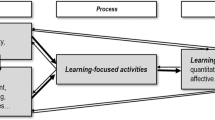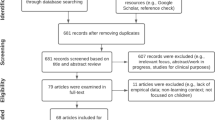Abstract
Learning processes and outcomes have been one of the main focuses of interest in educational research. The main objective of this systematic review is to provide a comprehensive and integrative view of the application of eye tracking to identify cognitive processes involved in college students’ learning process. The bibliographic sources for this review were databases Web of Science, PsycINFO and Scopus. After carrying out the screening process by two independent reviewers, 17 articles were included according to prespecified inclusion criteria. In general, it was observed a deeper learning and comprehension of the concepts when visual or picture stimulus were presented compared to text cues. This systematic review is a rapid updated of the processes involved in learning in college students, providing a comprehensive view of the current situation to design innovative educational programs.
Access this chapter
Tax calculation will be finalised at checkout
Purchases are for personal use only
Similar content being viewed by others
References
Lai, M., et al.: A review of using eye-tracking technology in exploring learning from 2000 to 2012. Educ. Res. Rev. 10, 90–115 (2013)
Mintzes, J.J., Wandersee, J.H., Novak, J.D.: Assessing science understanding. Academic Press, San Diego (1999)
Skaramagkas, V., et al.: Review of eye tracking metrics involved in emotional and cognitive processes. IEEE Rev. Biomed. Eng. 16, 260–277 (2023)
Alemdag, E., Cagiltay, K.: A systemtic review of eye tracking research on multimedia learning. Comput. Educ. 125, 413–428 (2018)
Rayner, K.: Eye movements in reading and processing information: 20 years of research. Psychol. Bull. 124(3), 372–422 (1998)
Jacob, R.J., Karn, K.S.: Eye-tracking in human-computer interaction and usability research: ready to deliver the promeses. In: Hyona, J.R., Radach, H.D. (eds.). The mind’s eyes: Cognitive and applied aspects of eye movements. Elsevier Science, Oxford (2003)
Sáiz-Manzanares, M.C., Marticorena-Sánchez, R., Rodríguez-Arribas, S., Escolar-Llamazares, M.C., Alonso-Martínez, L.: Estudio de los Procesos Cognitivos y Metacognitivos: Utilización de la Tecnología Eye Tracking Ventajas e Inconvenientes. Investigación y Práctica en Contextos Clínicos y de la Salud. Dykinson, Madrid (2022)
Ariasi, N., Mason, L.: From covert processes to overt outcomes of refutationtext reading: the interplay of science text structure and working memory capacity through eye fixations. Int. J. Sci. Math. Educ. 12, 493–523 (2014)
Bacca-Acosta, J., Tejada, J., Fabregat, R., Kinshuk, J.G.: Scaffolding in immersive virtual reality environments for learning English: an eye tracking study. Educ. Technol. Res. Dev. 70(1), 339–362 (2021). https://doi.org/10.1007/s11423-021-10068-7
Chen, Y., Yang, F.: Probing the relationship between process of spatial problems solving and science learning: an eye tracking approach. Int. J. Sci. Math. Educ. 12, 579–603 (2014)
Chen, S., She, H., Chuang, M., Wu, J., Tsai, J., Jung, T.: Eye movements predict students’ computer-based assessment performance of physics concepts in different presentation modalities. Comput. Educ. 74, 61–72 (2014)
Fan, K., et al.: Predicting the reader’s English level from reading fixation patterns using the Siamese convolutional neural network. IEEE Trans. Neural Syst. Rehabil. Eng. 30, 1071–1080 (2022)
Koc-Januchta, M., Höffler, T., Thoma, G., Prechtl, H., Leutner, D.: Visualizers versus verbalizers: effects of cognitive style on learning with texts and pictures–an eye-tracking study. Comput. Hum. Behav. 68, 170–179 (2017)
Kokoç, M., Ilgaz, H., Altun, A.: Effects of sustained attention and video lecture types on learning performances. Educ. Technol. Res. Dev. 68(6), 3015–3039 (2020). https://doi.org/10.1007/s11423-020-09829-7
Kühl, T., Stebner, F., Navratil, S., Fehringer, B., Münzer, S.: Text information and spatial abilities in learning with different visualizations formats. J. Educ. Psychol. 110(4), 561 (2018)
Li, W., Wang, F., Mayer, R.E., Liu, H.: Getting the point: which kinds of gestures by pedagogical agents improve multimedia learning? J. Educ. Psychol. 111(8), 1382 (2019)
Moon, J., Ryu, J.: The effects of social and cognitive cues on learning comprehension, eye-gaze pattern, and cognitive load in video instruction. J. Comput. High. Educ. 33, 39–63 (2021)
Pardi, G., Hienert, D., Kammerer, Y.: Examining the use of text and video resources during web-search based learning—a new methodological approach. New Rev. Hypermedia Multimedia 28(1–2), 39–67 (2022)
Peng, X., Xu, Q., Chen, Y., Zhou, C., Ge, Y., Li, N.: An eye tracking study: positive emotional interface design facilitates learning outcomes in multimedia learning? Int. J. Educ. Technol. High. Educ. 18(1), 1–18 (2021)
Ponce, H., Mayer, R.: Qualitatively different cognitive processing during online reading primed by different study activities. Comput. Hum. Behav. 30, 121–130 (2014)
Wang, J., Antonenko, P., Dawson, K.: Does visual attention to the instructor in online video affect learning and learner perceptions? An eye-tracking analysis. Computers & Education 146, 103779 (2022)
Yang, J., Zhang, Y., Pi, Z., Xie, Y.: Students’ achievement motivation moderates the effects of interpolated pre-questions on attention and learning from video lectures. Learn. Individ. Differ. 91, 102055 (2021)
Zander, S., Wetzel, S., Kühl, T., Bertel, S.: Underlying Procesess of an Inverted Personalization Effect in Multimedia Learning: An Eye-Tracking Study. Front. Psychol. 8, 2202 (2017)
Zander, S., Reichelt, M., Wetzel, S., Kämmerer, F., Bertel, S.: Does personalisation promote learners’ attention? An eye-tracking study. Frontline Learning Research 3, 1–13 (2015)
Acknowledgements
This study has been funded by two research projects: European eEarlyCare-T project No. 2021–1-ES01-KA220-SCH-000032661 and SmartLearnUni R&D&I project No. PID2020-117111RB-I00.
Author information
Authors and Affiliations
Corresponding author
Editor information
Editors and Affiliations
Rights and permissions
Copyright information
© 2023 The Author(s), under exclusive license to Springer Nature Switzerland AG
About this paper
Cite this paper
González-Diez, I., Varela, C., Sáiz-Manzanares, M.C. (2023). Use of Eye-Tracking Methodology for Learning in College Students: Systematic Review of Underlying Cognitive Processes. In: García Bringas, P., et al. International Joint Conference 16th International Conference on Computational Intelligence in Security for Information Systems (CISIS 2023) 14th International Conference on EUropean Transnational Education (ICEUTE 2023). CISIS ICEUTE 2023 2023. Lecture Notes in Networks and Systems, vol 748. Springer, Cham. https://doi.org/10.1007/978-3-031-42519-6_27
Download citation
DOI: https://doi.org/10.1007/978-3-031-42519-6_27
Published:
Publisher Name: Springer, Cham
Print ISBN: 978-3-031-42518-9
Online ISBN: 978-3-031-42519-6
eBook Packages: Intelligent Technologies and RoboticsIntelligent Technologies and Robotics (R0)




